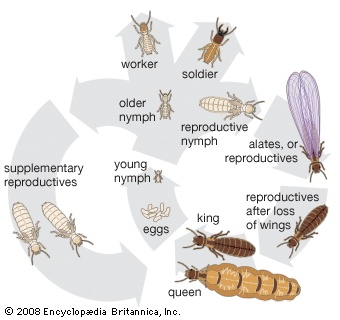life cycle
biology
in biology, the series of changes that the members of a species undergo as they pass from the beginning of a given developmental stage to the inception of that same developmental stage in a subsequent generation.
 In many simple organisms, including bacteria and various protists, the life cycle is completed within a single generation: an organism begins with the fission of an existing individual; the new organism grows to maturity; and it then splits into two new individuals, thus completing the cycle. In higher animals, the life cycle also encompasses a single generation: the individual animal begins with the fusion of male and female sex cells (gametes); it grows to reproductive maturity; and it then produces gametes, at which point the cycle begins anew (assuming that fertilization takes place).
In many simple organisms, including bacteria and various protists, the life cycle is completed within a single generation: an organism begins with the fission of an existing individual; the new organism grows to maturity; and it then splits into two new individuals, thus completing the cycle. In higher animals, the life cycle also encompasses a single generation: the individual animal begins with the fusion of male and female sex cells (gametes); it grows to reproductive maturity; and it then produces gametes, at which point the cycle begins anew (assuming that fertilization takes place).In most plants (plant development), by contrast, the life cycle is multigenerational. An individual plant begins with the germination of a spore, which grows into a gamete-producing organism (the gametophyte). The gametophyte reaches maturity and forms gametes, which, following fertilization, grow into a spore-producing organism (the sporophyte). Upon reaching reproductive maturity, the sporophyte produces spores, and the cycle starts again. This multigenerational life cycle is called alternation of generations; it occurs in some protists and fungi as well as in plants.
The life cycle characteristic of bacteria is termed haplontic. This term refers to the fact that it encompasses a single generation of organisms whose cells are haploid (i.e., contain one set of chromosomes). The one-generational life cycle of the higher animals is diplontic; it involves only organisms whose body cells are diploid (i.e., contain two sets of chromosomes). Organisms with diplontic cycles produce sex cells that are haploid, and each of these gametes must combine with another gamete in order to obtain the double set of chromosomes necessary to grow into a complete organism. The life cycle typified by plants is known as diplohaplontic, because it includes both a diploid generation (the sporophyte) and a haploid generation (the gametophyte).
- Both, Jan
- Bothnia, Gulf of
- Botho Eulenburg, Graf zu
- Botho, Graf zu Eulenburg
- Both, Pieter
- Bothriolepis
- Bothwell, Francis Stewart Hepburn, 5th earl of
- Bothwell, James Hepburn, 4th earl of, Duke Of Orkney And Shetland
- Botocudo
- Botox
- Botoşani
- Bo tree
- botrytis blight
- Botsaris, Markos
- Botswana
- Botswana, flag of
- Botta, Carlo Giuseppe Guglielmo
- Botta, Paul-Émile
- Bottesini, Giovanni
- Botticelli, Sandro
- bottle
- bottle gourd
- bottlenose whale
- bottle tree
- Bottome, Margaret McDonald